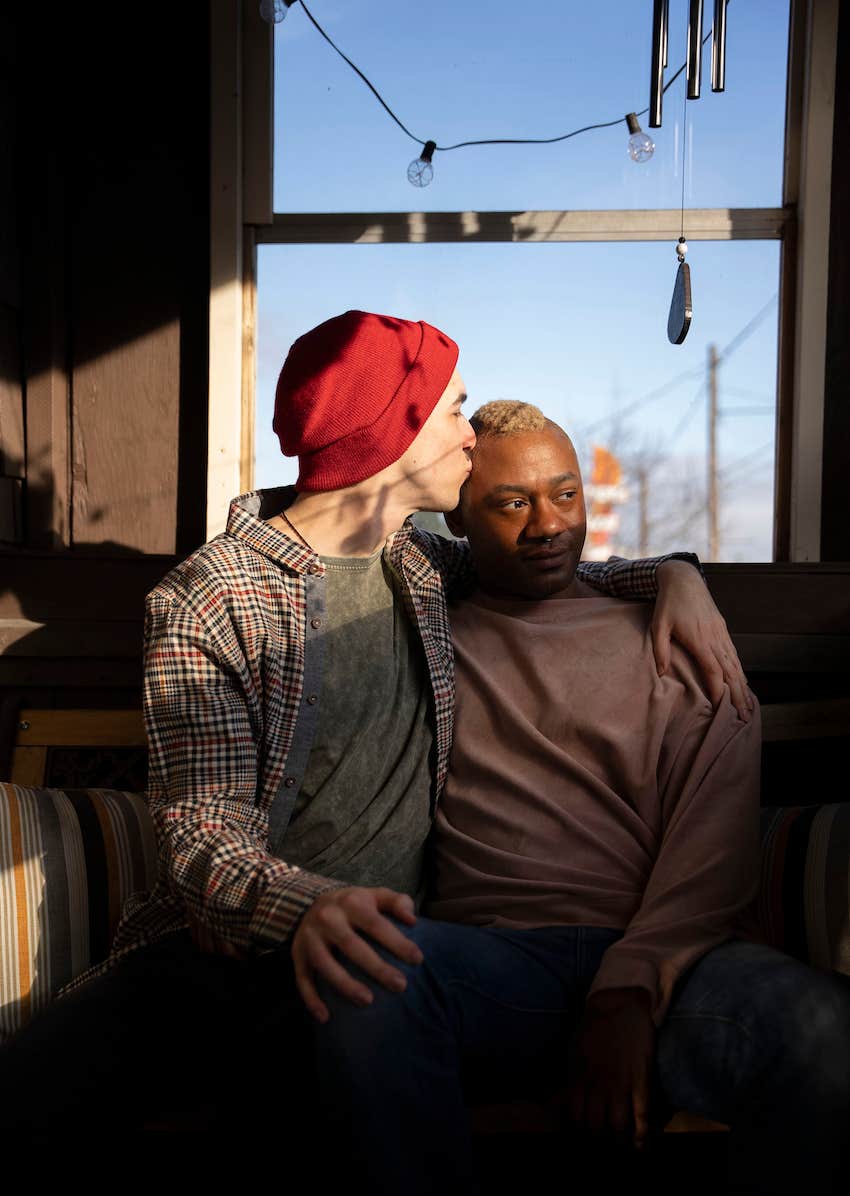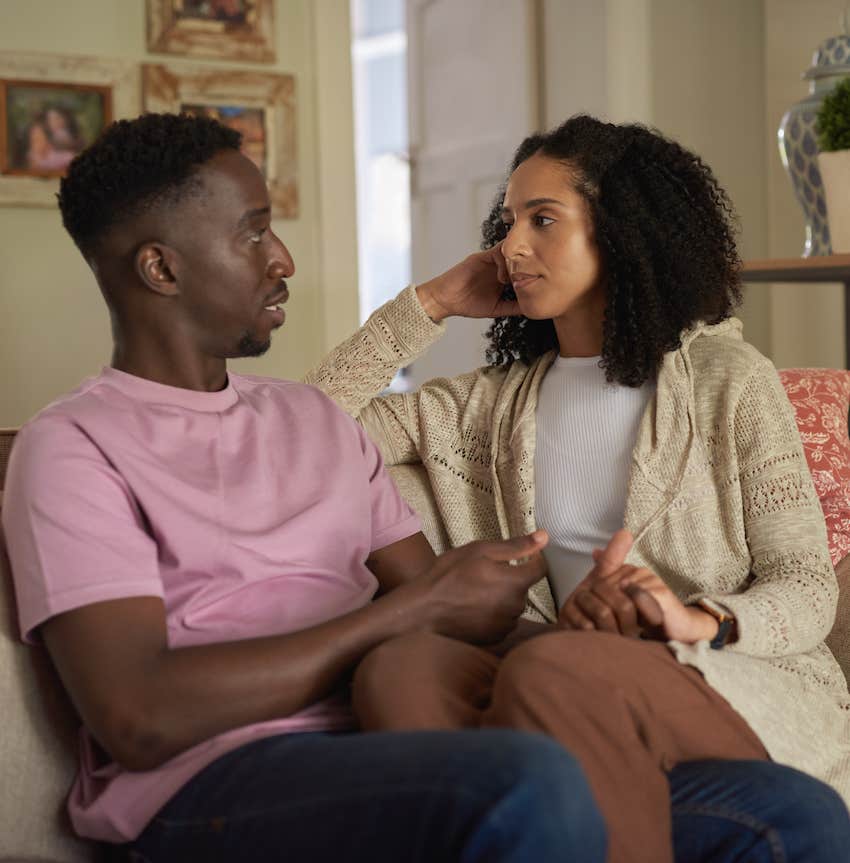Why The Best Lovers Are Married Couples, According To Research
The hormones of love can bless couples with passion for a lifetime.
 Oneinchpunch | Canva
Oneinchpunch | Canva A 1999 survey of 2930 men and women 45 and older commissioned by the AARP (The American Association of Retired Persons) shows that sexuality remains an essential element in older couples’ lives. Approximately 49% of those with a regular partner engage in sex once a week or more. Most of these adults say, “A satisfying sexual relationship is important to their quality of life,” Oops! I thought sex was just for young couples.
Contrary to popular opinion, current research agrees with these older people that regular sexual activity improves their lives. When a young monogamous couple enjoys a loving sexual relationship, their sex life continues to get better as they age. What a wonderful lifelong sexual journey it is of growth and bonding from newlyweds to senior lovers. The ecstatic wonder of youth only gets better over time.
Doctors McIlhaney and Bush explain in Hooked: New Science on How Casual Sex Is Affecting Our Children how this bonding phenomenon occurs over decades in each other’s arms. Indeed, MRI and SPECT brain scans and new developments in neuroscience are providing a greater understanding of the role of three major hormones of love released during sex.
Here's the science behind why the best lovers are married couples:
1. Dopamine hooks people on sex
Dopamine is a brain chemical that affects a person’s enjoyment of many activities. We sometimes call it the feel-good hormone. We get a physical and emotional high of intense energy, excitement, and hyper-focusing when we do something we thoroughly enjoy. It makes us want to keep doing the pleasurable activity over and over — perhaps even to the point of blissful exhaustion.
2. Dopamine doesn’t have a conscience or a sense of right or wrong
The bad news is dopamine doesn’t care if the activity is good or bad for us or if it’s harmful to other people. Dopamine rewards us for both healthy and destructive activities. It doesn’t care if we’re getting our thrills from using illegal drugs, drinking until we throw up, or racing our car down the highway weaving in and out of traffic. The feel-good hormone can cause both adolescents and adults to become addicted to the activity that gives them a blast of pleasure.
3. Sex is one of the most powerful activities that gives a dopamine rush
As might be expected, sexual activity releases dopamine into a person’s system to give them a rush regardless of the circumstances or with whom the tryst occurs. We all probably already know sex is one of the most powerful generators of the feel-good reward of dopamine.
An emotional bond is not necessary for dopamine to flood a person’s brain. The hormone of pleasure, like all good things, can be used for unhealthy activity, like sex only for the sake of conquest, which ignores the emotional bond.
4. Sex plus dopamine makes married couples addicted to each other
The hormonal rush of dopamine benefits married couples. Frequent lovemaking over a lifetime bonds married couples to each other. It greatly strengthens their emotional attachment and delight in each other.
5. The primary hormone of love is oxytocin
The hormone oxytocin is necessary for healthy sexual activity and bonding. One way it is released into the brain is by warm intimate touch. Oxytocin has two roles.
- It increases the desire for more touching.
- At the same time, it bonds the touched to the one who is doing the touching.
6. Oxytocin and touching often leads to sexual contact and bonding
Intimate touching and orgasm flood the brain with oxytocin. This creates a cycle of desiring more touching and lovemaking which leads to more desire for touching and sex. At the same time, one partner woman is becoming more and more bonded to the other.
7. Older couples get the most benefits from oxytocin, touching, and sex
Frequent lovemaking and oxytocin create a special long-term connectedness and happiness. A spouse in such a relationship rarely seeks sexual activity outside their marriage. They are firmly bonded to their partner who gives them so much pleasure.
8. Oxytocin bonding is more than an emotional connection for older couples
The bonding takes place in the brain. Doctors McIlhaney and Bush state, “It is almost like the adhesive effect of glue — a powerful connection that cannot be undone without great emotional pain.” Reacting with brain cells, oxytocin physically binds the spouses to each other.
9. Vasopressin is another hormone of love
Vasopressin is another glue for bonding a couple. Vasopressin bonding is partially responsible for social binding. This hormone has two major roles in relationships: (1) It glues or bonds the couple to each other. (2) It also bonds the parent to their children.
 shutterstock_2120390081-couple-closeness via shutterstock
shutterstock_2120390081-couple-closeness via shutterstock
10. Vasopressin is the commitment chemical
Oxytocin and vasopressin affect our brains in a similar way to the bond the spouses have with each other. This bond becomes stronger over the years with frequent lovemaking. If a spouse wants their partner to love them more, they need to respond to their partner's sexual desires with gusto. Even better, they should initiate lovemaking.
11. Touching releases the hormones of love when illness gets in the way
Diabetes and other medical problems can hamper a person's ability to express physical love. Certain drugs play havoc with a loving person's desires. Yet even in these instances, a couple can share love through hugging, cuddling, and fondling each other. Even though it isn’t as intense a form of lovemaking as sexual intercourse, intimate touching still releases hormones of pleasure and bonding.
 mavo via Shutterstock
mavo via Shutterstock
All three hormones, dopamine, oxytocin, and vasopressin are values-neutral. In other words, none of the hormones care who the people are who share intimacy. The hormones still bind the couple together.
12. The hormones of love can lead to long-term bad relationships
The hormones don’t care if one of the partners is a self-centered narcissist or a verbal abuser. The hormonal bonding caused by sexual activity can trap the more gentle and loving partner in a relationship with a person without natural affection and harmful behavior. People who are being abused frequently have a hard time mustering the emotional strength to end the relationship.
13. The three hormones make people try to figure out what’s wrong
All three hormones greatly affect behavior. You may wonder why you love someone who treats you so disrespectfully. Or, you may question why you keep dating a person who verbally abuses you. You may ask what is wrong with them so they can’t develop a deep permanent relationship with anyone.
14. The hormones of love benefit couples
If a couple regularly expresses sexual love to each other, their emotional bond grows stronger over the years. As they age, the affection their bodies speak to each other deepens. The hot, impatient hormones of youth give way to the mellow sweetness of a lifetime of passionate loving.
The AARP Sexuality Report says, “Respondents with a regular sexual partner are more satisfied with their sex life, and generally have a better outlook on life.” This becomes more pronounced as the couple advances in age and partakes of the three sexual hormones. “Men ages 70 and older and women ages 60 and older tend to have a more optimistic outlook on their present situation than younger respondents.”
 pikselstock via Shutterstock
pikselstock via Shutterstock
In addition to limitations from poor health, the number one reason for sexual dissatisfaction from the older participants is a lack of initiative from their partner when it comes to having sex. My experience of over 40 years shows that is also the number one reason for marital unhappiness.
The hormones of love can bless couples with a passion for a lifetime. Not only do the spouses give each other great mental and physical pleasure, but in doing so they also bind themselves together in greater love and commitment for facing the normal problems of life.
Patsy Rae Dawson is a Sexuality & Personality Breakthrough Trainer/Coach. Her expertise ranges from the joys of soulmate to the beautiful sexual teachings of the Song of Solomon to the complex issues of difficult marriages. She imparts hope with her ability to unlock the scriptures and challenge traditional views.
